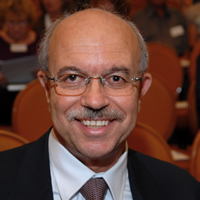
The alchemists of the Middle Ages never succeeded in turning lead into gold, even if their work did provide the foundations for much of modern chemistry. Since then, scientists have learned ways to change one substance into another, even one element into another, and we use those techniques to create useful things. K.C. Nicolaou is something of a modern alchemist, but he works with the most complex structures in nature, organic molecules.
Nicolaou's forte is a highly specialized field of organic chemistry called total synthesis, which is the creation of organic molecules from scratch in the laboratory. Through total synthesis, rare molecules found in nature can be made in great numbers for study or to serve as the basis for drugs, or entirely new types of complex organic molecules can be made from simpler precursor molecules. Aside from creating useful substances, total synthesis can also shed light on various chemical processes and reactions, provide better structural information than X-ray techniques, and lead to new developments in biochemistry and medicine. K.C. Nicolaou has spent an illustrious career pioneering new methods in total synthesis, finding ways to synthesize substances that are not only scientifically fascinating but have critically important medical uses.
Nicolaou was born in Cyprus, then emigrated to England as a young man to study chemistry in London. After obtaining his doctorate, he held postdoctoral appointments at Columbia University and Harvard University, before settling in as a professor at the University of Pennsylvania. After more than a decade at Penn, he moved on to dual appointments at the Scripps Research Institute, where he is chairman and professor in the Department of Chemistry, and the University of California, San Diego, where he is Distinguished Professor in the Department of Chemistry and Biochemistry. Throughout it all, he has been enormously productive and firmly established himself as one of the world’s most creative and brilliant organic chemists.
While direct synthesis is never an easy process, Dr. Nicolaou seems to have made a career out of finding ways to assemble types of molecules so challenging in their complexity that their synthesis was generally considered impossible. Invariably, he seems to choose the most difficult problems of molecular synthesis, and time and time again, he has managed to solve them in imaginative and elegant ways. Among his most famous successes are the major anticancer drugs Taxol and Calicheamicin; rapamycin, an immunosuppressant; the marine biotoxins brevetoxin A and B; the antibiotic vancomycin; and many others of critical value both for direct medical applications and for research use.
Perhaps as important as these individual achievements, however, are the new strategies and methods Dr. Nicolaou has devised in direct synthesis, which have vastly expanded the toolbox available for his colleagues in their own work. By demonstrating that even the most complex and diverse organic compounds can be synthesized with the proper methods, he has advanced the science of total synthesis and with it, the experimental techniques of biology, medicine, and chemistry that depend upon it. He has published more than 700 articles in the literature, holds more than 60 patents for his discoveries and developments, and has received scores of scientific honors, fellowships, honorary degrees, and other awards from all over the world.
Nicolaou is also a gifted teacher and ambassador of learning who has shared his knowledge and love of chemistry and science in general through popular books and articles, not to mention the legions of students that have studied with him throughout his career. The two volumes of his textbook Classics in Total Synthesis: Targets, Strategies, Methods are standards for chemistry students, and his recent book Molecules That Changed the World brings the excitement and importance of his life's work into focus for a more general audience. Even with the many scientific challenges K. C. Nicolaou has already faced and conquered, his dynamic creativity and boundless curiosity will drive him to address and to answer ever more daunting questions.
Information as of April 2011

